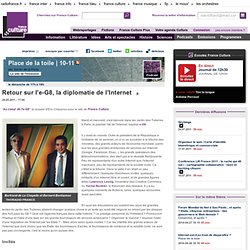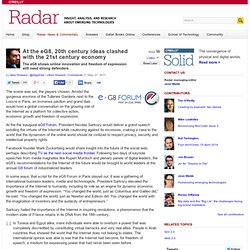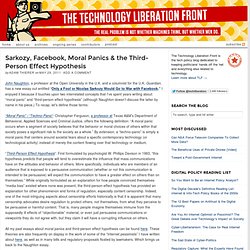

Diplomatie de l'Internet. "Au coeur de l'e-G8", le dossier d'Eric Chaverou pour le site de France Culture.

Bertrand de La Chapelle et Bernard Benhamou Th©Radio France Mardi et mercredi, s'est déroulé dans les Jardin des Tuileries, à Paris, le premier G8 de l'Internet, baptisé e-G8. Il y avait du monde. Outre le président de la République à l'initiative de ce sommet, on a vu se succéder à la tribune des ministres, des grands acteurs de l'économie mondiale, parmi eux les plus grandes entreprises de services sur Internet (Google, Facebook, Ebay...), les grands opérateurs des télécommunications, des start ups à la réussite flamboyante. Peu de représentants d'un autre Internet que l'Internet marchand, peu de représentants de la société civile. En quoi les discussions qui avaient lieu sous les grandes tentes du jardin des Tuileries allaient changer quelque chose à un texte qui avait été négocié en amont par les sherpas des huit pays du G8 ?
Invités Sons - Discours d'inauguration de l'e-G8 du président de la République.
Compétition industrielle E.U. - U.S. Innovation = breaking rules. Lessig's answer to Sarkozy. At the eG8, 20th century ideas clashed with the 21st century economy. The scene was set, the players chosen.

Amidst the gorgeous environs of the Tuileries Gardens next to the Louvre in Paris, an immense pavilion and grand dais would host a global conversation on the growing role of the Internet as a platform for collective action, economic growth and freedom of expression. At the the inaugural eG8 Forum, President Nicolas Sarkozy would deliver a grand speech extolling the virtues of the Internet while cautioning against its excesses, making a case to the world that the dynamism of the online world should be civilized to respect privacy, security and intellectual property rights. Facebook founder Mark Zuckerberg would share insight into the future of the social web, perhaps describing TV as the next social media frontier.
In some ways, that script for the eG8 Forum in Paris played out. It was a gathering of international business leaders, media and technologists. Defending the Internet Voicing the concerns of civil society Related: Sarkozy, Facebook, Moral Panics & the Third-Person Effect Hypothesis. “Moral Panic” / “Techno-Panic“: Christopher Ferguson, a professor at Texas A&M’s Department of Behavioral, Applied Sciences and Criminal Justice, offers the following definition: “A moral panic occurs when a segment of society believes that the behavior or moral choices of others within that society poses a significant risk to the society as a whole.”

By extension, a “techno-panic” is simply a moral panic that centers around societal fears about a specific contemporary technology (or technological activity) instead of merely the content flowing over that technology or medium. “Third-Person Effect Hypothesis“: First formulated by psychologist W. Phillips Davison in 1983, “this hypothesis predicts that people will tend to overestimate the influence that mass communications have on the attitudes and behavior of others.
All my past essays about moral panics and third-person effect hypothesis can be found here. I think Naughton’s probably on to something here. Quite right.
Moral Panics.